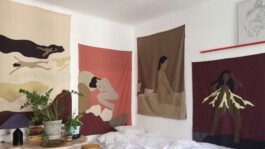When They Returned To their Bodies, They returned home, Series, 2019, Expand 155 x 125 cm, Feel 190 x 142 cm, Breathe 150 x 150 cm, Rest 194 x 155 cm, Perceive 215 x 143

I wanted to visualize worlds and bodies in balance with themselves and each other, where the rational is not dominating over other forms of knowledges such as feeling, perceiving and being, but existing equally next to them. So that my body as a whole entity is able to interact with its reality in a direct and intuitive way.
It bothers me that my energy is burned within my mind while arguing internally which codes are now the ones to perform: which clothes are safe, which words are smart, which posture is confident, which reaction is accurate, thereby inevitably cutting off from the rest of my body what it already knows best. Of course the underlying pattern of this self-questioning is set by my socialization in the white supremacist heterosexual capitalist patriarchy (a term developed by bell hooks), which produces subjects only allowed to show singular pieces of themselves, while hiding what does not serve the capitalist mode of re/production.
Returning to the body and all its divisions holds subversive potential:
“For as we begin to recognize our deepest feelings, we begin to give up, of necessity, being satisfied with suffering and self-negation, and with the numbness which so often seems like their only alternative in our society” (excerpt from the essay “Uses of the Erotic: The Erotic as Power” by Audre Lorde in her book Sister Outsider). I wanted to imagine a place where surviving does not require cutting away from oneself, where no structures can trap me because I can hear my body, where I allow myself to feel my frustrations because I know that they will move me, where my fear will make me sharp and precise, where my anger will let me stop whatever is bothering me and where my resting is not seen as a waste of time but a responsibility.
Inside of me there is a power that can heal me and that wants to survive at all costs.
When They Returned To their Bodies, They returned home, Series, 2019, Expand 155 x 125 cm, Feel 190 x 142 cm, Breathe 150 x 150 cm, Rest 194 x 155 cm, Perceive 215 x 143

I wanted to visualize worlds and bodies in balance with themselves and each other, where the rational is not dominating over other forms of knowledges such as feeling, perceiving and being, but existing equally next to them. So that my body as a whole entity is able to interact with its reality in a direct and intuitive way.
It bothers me that my energy is burned within my mind while arguing internally which codes are now the ones to perform: which clothes are safe, which words are smart, which posture is confident, which reaction is accurate, thereby inevitably cutting off from the rest of my body what it already knows best. Of course the underlying pattern of this self-questioning is set by my socialization in the white supremacist heterosexual capitalist patriarchy (a term developed by bell hooks), which produces subjects only allowed to show singular pieces of themselves, while hiding what does not serve the capitalist mode of re/production.
Returning to the body and all its divisions holds subversive potential:
“For as we begin to recognize our deepest feelings, we begin to give up, of necessity, being satisfied with suffering and self-negation, and with the numbness which so often seems like their only alternative in our society” (excerpt from the essay “Uses of the Erotic: The Erotic as Power” by Audre Lorde in her book Sister Outsider). I wanted to imagine a place where surviving does not require cutting away from oneself, where no structures can trap me because I can hear my body, where I allow myself to feel my frustrations because I know that they will move me, where my fear will make me sharp and precise, where my anger will let me stop whatever is bothering me and where my resting is not seen as a waste of time but a responsibility.
Inside of me there is a power that can heal me and that wants to survive at all costs.